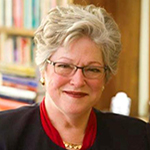 By Molly T. Marshall
By Molly T. Marshall
If you are bingeing on Hallmark Movies these days (and I have hard evidence that some of the BNG readers are), you can attest that these films are full of “Christmas magic,” encouragement to “just believe,” and wishes for gifts, romance, a loving dog, and family, all realized just in the nick of time — the last 7-8 minutes! Often, it is the children who retain a sense of wonder, and they instruct parents and other jaded adults about its significance. Angels show up on occasion and prompt hopeful wonder, which displaces cynicism.
Wonder is the experience of being in a state of rapt or questioning attention to the extraordinary or mysterious. Wonder is a challenging form of epistemology, for one cannot master mystery with comprehensive knowing. One can only be receptive to the stunning disclosure that comes from beyond the self. God created humanity with the capacity for wonder, but we shroud it with skeptical rationality.
When Phillip Brooks penned the lyrics for “O Little Town of Bethlehem” in 1868, he included these words:
While mortals sleep, the angels keep
their watch of wondering love.
He is pointing to the angelic announcement, proclaiming the holy birth. Of course, mortals sleep at night (well, most), and the shepherds receive the birth announcement only because they were keeping watch. Yet, I think there is a deeper significance in his libretto. I think he wants us to learn something from angels about how we are to respond to God.
Students of scripture recall that angels are quite busy in the scenes leading up to the birth of Jesus. Zechariah encounters Gabriel while serving his rotation as a priest at the sanctuary of the Lord. When he questions (no hopeful wonder yet) how he and Elizabeth — at least he admits he is old before declaring her old, too–will bring into the world the forerunner of the coming messiah, Gabriel answers: “I stand in the presence of God, and I have been sent to speak to you and to bring you this good news” (Luke 1:19).
Later there is the remarkable conversation between Gabriel and Mary. Sent by God once again, the angel is met with the same question, “how can this be?” The difference between the two scenes is Mary’s faithful response. She believes before she conceives, as the ancients put it. Because Zechariah does not receive the good news, he would not be able to speak until the promise was fulfilled and the child was born. Actually, the next time he can speak he offers the Benedictus, praising God for the gift of a “mighty servant.”
Joseph also has an angelic visitation, according to Matthew, and because the messenger gave him spiritual insight about Mary’s virginal conception, he obeyed the instruction and took her as his wife rather than divorcing her in a “quiet” manner (Matthew 1:19-25). This angel has an easier job; Joseph does not protest, which may be because he was asleep.
In the old abbey church at St. John’s in Collegeville, Minn., there is a remarkable scene in the apse behind the place where the Eucharistic altar stood. It is a group of angels covering their eyes with their wings. What is transpiring below in the central act of worship is too holy for their gaze and, reminiscent of Isaiah 6, they stand in adoring wonder at the glory of God. The holy both attracts and constrains, as Rudolf Otto taught us.
This line from the beloved Brooks’ carol is instructive. The “watch of wond’ring love” suggests that love constructs a channel to understanding. We do not love because we understand fully; rather, our love allows a deeper understanding, a reverence for the beauty unfolding in God’s long faithfulness to the salvation of humans.
Angels are God’s emissaries in this pursuit. While there is a mysterious aspect to this “little higher than humans” realm in the Bible, an angelos is God’s messenger. An angel knows how to listen to God, speak for God, and do God’s bidding. Sometimes they look like humans — or are humans — but there remains an elusive quality to these divinely appointed heralds.
Once during my Ph.D. program, I attempted to write a biblical theology of angels. My efforts were hardly worthy of publication, more like an academic prat fall. I was trying to follow conventions of scholarship that prized critical thinking over religions affection, Jonathan Edwards’ idea. Attending to a more demythologized universe, I found little room for these teachers of wonder.
Yet, as we celebrate the coming of Christ once again, we need the assistance of those who stand in God’s presence, bring good news, and offer instruction. They invite us to watch in wondering love, a transformative grace that allows us a more intimate glimpse of God’s glorious nearness.
